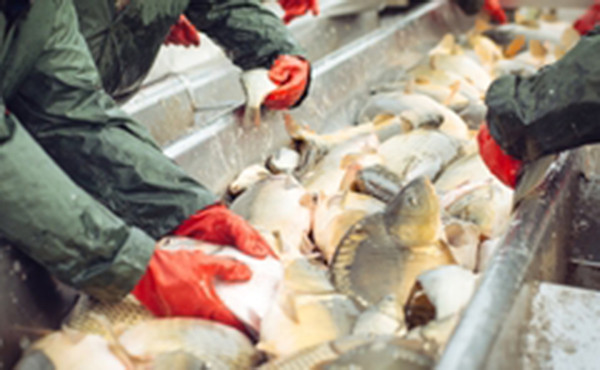✕



✕

Tag:fishinganimal welfare concerns 2024-10-17 13:37

Project UK has marked seven years of industry collaboration to help six UK fisheries adopt sustainable fishing management as consumer anxieties about animal welfare standards in the seafood sector rise. Major seafood retailers, researchers and NGOs have come together under the initiative to drive the uptake of the global wild-capture certification program, Marine Stewardship Council (MSC).
The campaign covers species such as king scallops, monkfish, lemon sole, plaice, crab, European lobster and Nephrops. Estimates suggest that represented fisheries’ contribution to the UK’s economy is £177 million (US$ 193 million).
Beyond improvements in individual sustainable fishing operations, the project’s Fishery Improvement Projects (FIPs) have critical implications for marine ecosystems and the fishing industry, grappling with dire ethical and environmental concerns. These include overreporting sustainability scores, understating declines in fish stocks and claims of crustacean cruelty in retailer supply chains.
“Project UK has templated a model that enables a diverse group of stakeholders to come together. Having the fishing industry at the heart of the conversations is key to long term engagement and meaningful change, while the engagement of the supply chain, academics and NGOs each play their own significant role,” Lisa Bennett, senior fisheries outreach manager at MSC, tells Food Ingredients First.
“Sustainability is everything”
Major retailers such as Tesco, Sainsbury’s, M&S and Waitrose, as well as seafood supply chain businesses like MacDuff Shellfish, Hilton Foods and Lyons Seafoods, in addition to WWF UK, Defra, Cefas and other research institutions have funded the project.
Mike Park, OBE, the CEO of the Scottish Fisheries Sustainable Accreditation Group, says: “We’ve been involved in Project UK from day one because this journey of step-by-step improvement, and ultimately the ideal of reaching a certified product, is essential to the Scottish fleet — as stewards of the resource and as a constellation of seafood businesses. Sustainability is everything.”
“This is how we future-proof Scottish fishing, by continuously evolving our understanding of the environment we operate in and working to match the supply chain expectation.”
Research, certifications and challenges
Project UK identified 64 actions in the first two rounds, which resulted in 52 score improvements upon implementation.
“Across the different FIPs, there has been a strong commitment to maintain momentum. For some, like the Nephrops group, this has led to the creation of a core working group who have committed to enter the ‘In-Transition to MSC’ programme. Other FIPs like scallops have also maintained a core working group and are discussing the best next steps for future improvements,” highlights Bennett.
The fisheries involved have also commissioned 25 research projects and reports, including findings that have contributed to understanding fish stocks and fishing’s impact on habitats.
Bennett notes that the FIPs come when the UK’s national fishing policy evolves amid major political events such as Brexit and new legislation, including last year’s first Fisheries Management Plans (FMPs).
However, smaller fishing operations could face challenges adapting to government-led initiatives on tracking fishing behavior, such as Vessel Monitoring Systems and Remote Electronic Monitoring. Bennett says that while Project UK calls for better data collection and sharing among fisheries, its recommendations factor in small fisheries.
“The FIPs and Project UK are not necessarily about bringing in new rules (although that might be part of the action plan). Any actions that call for the development of new rules or regulations are drafted by an independent consultant and agreed upon by the steering groups, ideally including representatives for the fishing industry, both large and small operators. The actions should be developed to be achievable and acceptable to all fishing vessels involved in the FIP.”
Targeting policy
The groups involved strive to exert influence on national policy. The crab and lobster fisheries have held workshops to shape policy consultations and support subsequent FMPs with formal responses.
“Brown crab and lobster have long been ‘the poor relation’ in terms of national policy, and the FIP has certainly contributed to highlighting the importance of both species. Project UK has been incredible and innovative in terms of engaging with our fleet in ways which work for them — a rare approach — which has gone a long way toward restoring faith that people who talk about management are also able to listen,” says Beshlie Poole from the South Devon and Channel Shellfishermen’s Association.
Bennett notes that consumers can ensure their seafood comes from a sustainable source in multiple ways, starting with vigilance.
“The easiest way is to look for the MSC blue ecolabel on the pack when buying fish and seafood at the local supermarket. This sends the message to retailers that sustainability is important to consumers. MSC’s Theory of Change outlines how the market, consumers and fisheries achieving certification and working together can all drive us toward a more sustainable basis for fishing.”
House of Lords report urges complete ban on junk food advertising
Clinical research finds daily pistachio consumption may “significantly improve eye health”
Nestlé taps diverse food trends with ready-to-prepare Asian and Mexican culinary products
USDA backs Campbell’s sustainable tomato cultivation efforts to propel “climate-smart agriculture”
Symrise bolsters regenerative farming to secure stable supply for natural ingredients
Daymer Ingredients to distribute Revyve’s egg-replacing texturizers in the UK
About Us Terms of Service Privacy Policy Contact Us
Hotline(+86)17301604571
 Enterprise WeChat
Enterprise WeChat
for Client Service
 EZBuy
EZBuy
WeChat APP
Sinoexpo Digital Platform
Shanghai Sinoexpo Informa Markets International Exhibition Co., Ltd. All rights reserved
沪ICP备05034851号-77
 沪公网安备31010402000543号
沪公网安备31010402000543号